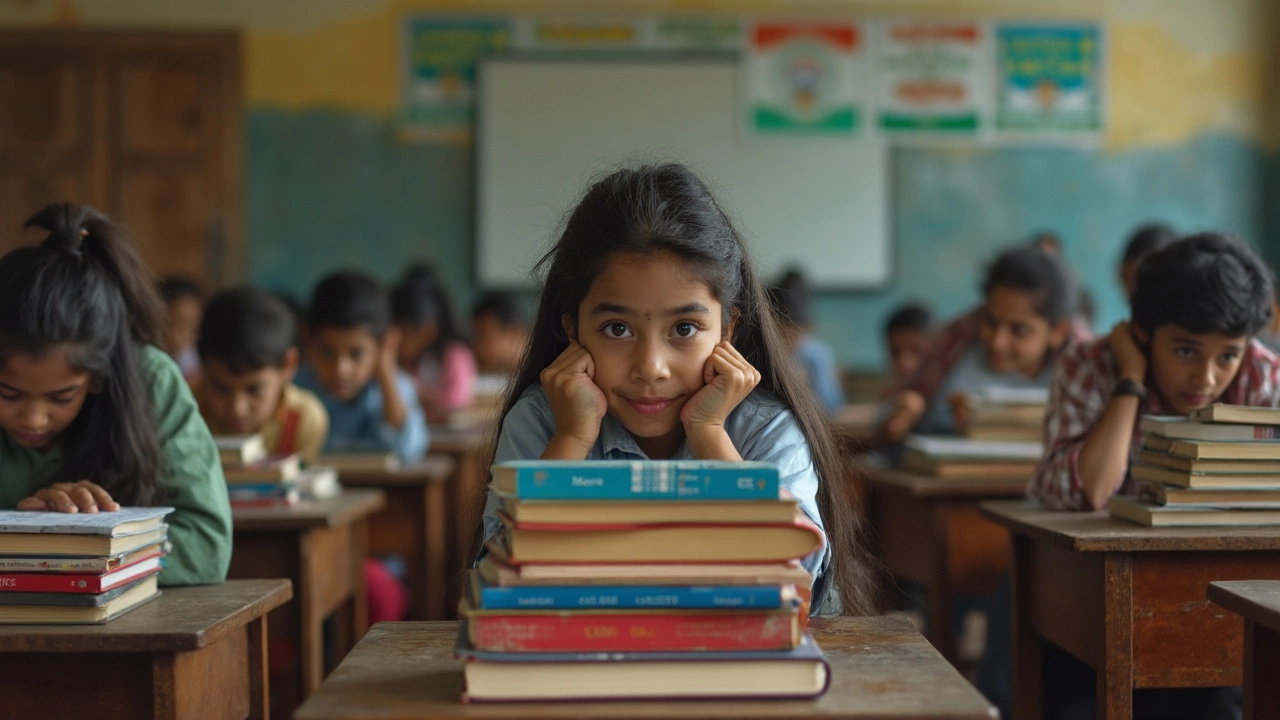Stuck in endless talks about which school board is toughest? If you’re a student or a parent, you’ve heard someone say, “The CBSE board is brutal,” or “Try the ICSE if you want a real challenge.” The truth? There’s a lot more to it than just scary stories from seniors.
When people talk about the hardest board in the world, what are they really comparing? Is it the crazy big syllabus, the pressure in exams, or the way questions mess with your head? Most folks in India land on CBSE or ICSE as top contenders, and a few throw in IB and Cambridge for good measure.
But here’s where it matters to you: the pressure isn’t just about what's in the textbooks. It’s also about how you learn, how the exams test your memory (or your understanding), and how much support you get at school or at home. Some boards are famous for thick, fact-filled textbooks, while others love brain-twisting problems that make you think sideways.
If you’re pushing through the CBSE syllabus right now, you probably care more about useful tips than about the big debate. Stick around if you want real advice — the kind you can use next week, not vague ‘work hard’ slogans.
- What Makes a Board 'Hard'?
- The CBSE Syllabus Compared to Other Boards
- Surviving the Toughest Exams: Smart Study Tips
- Fact vs Myth: Are Boards Getting Tougher?
What Makes a Board 'Hard'?
You’ll hear a lot of people say that the hardest board is the one with the biggest stack of books or the longest exams, but let’s get real—difficulty is more than just the number of chapters. If you want to compare boards, focus on these things:
- Syllabus depth: Is it loaded with detailed theory, or does it skip to the basics?
- Exam pattern: Do the question papers make you think for yourself, or can you get by memorizing notes?
- Grading: Super strict or more relaxed? Some boards barely pass anyone unless they’re perfect.
- Pressure and competition: In some places, the race for marks is just insane, with ranks and scores posted everywhere.
- Resources and support: Good schools and teachers can make even a tough syllabus feel doable. A bad setup can make easy stuff feel like Everest.
For example, CBSE syllabus covers all the main subjects but tries to keep things straightforward and logical. That doesn’t always mean it’s easy, just that it’s less about cramming pure facts than some other boards.
Take this quote from education expert Dr. R. Sharma in India Today:
“What makes a board hard is not just the curriculum, but how questions are framed. Boards that encourage independent thinking tend to feel tougher, especially to students used to learning by rote.”
Some boards, like IB, hammer down on critical thinking and project work. Others, like state boards in certain states, put more pressure on straight textbook learning. The bottom line: There’s no simple answer. What’s hard for one student might be totally manageable for another, depending on learning style and environment.
| Board | Focus | Exam Type |
|---|---|---|
| CBSE | Concepts & Application | Mixed (Theory & Reasoning) |
| ICSE | Depth & Detail | Lengthy & Descriptive |
| IB | Critical Thinking | Projects & Essays |
The real trick is to know what you’re up against and play smart. Understanding how your board works—whether it’s CBSE or any other—is half the battle won.
The CBSE Syllabus Compared to Other Boards
If you’re in India, chances are you’ve heard endless debates about which board is tougher: CBSE, ICSE, State Board, or international ones like IB and Cambridge. Each board has its quirks, and knowing these can help you make sense of what you’re really up against.
Let’s get something straight. CBSE covers the NCERT textbooks, which are honestly pretty direct and made with competitive exams in mind. Many entrance exams (JEE, NEET) are based on this syllabus, which is why so many students and schools stick with CBSE. It’s all about giving you a strong base in Science and Math, and English is there, but it doesn’t dig as deep as ICSE literature does.
ICSE is textbook-heavy and sometimes feels like it never ends. It dives deeper into English, and expects more writing. Some say it helps sharpen your language skills in ways CBSE can’t match, but it’s definitely more time-consuming. If you love long essays and have time to revise thick chapters, ICSE might be your thing.
Now, state boards? They’re all over the place. Some are easier, some not so much—it depends on where you live. Usually, state boards focus more on rote learning, and their books may not have the up-to-date stuff that CBSE or IB offers.
The IB and Cambridge boards can throw you in the deep end. Their motto? Less mugging, more thinking. Problem is, they don’t always match up with Indian entrance exam patterns. They tend to use a lot of projects and assessments, so you won’t just be memorizing answers for a final test.
- CBSE: Syllabus is broad but less detailed, lots of MCQs lately, and focuses on understanding concepts, not just memorizing.
- ICSE: More theory, more writing, wide coverage in subjects (especially English), and expects detailed answers.
- State Boards: Big differences by state, but often simpler textbooks, and mostly focus on local requirements.
- IB/Cambridge: More focus on analysis, projects, and critical thinking—less helpful for Indian entrance exams, but great for overseas college applications.
Here’s a quick comparison to make it easier:
| Board | Exam Style | Subject Focus | Difficulty (Student View) |
|---|---|---|---|
| CBSE | MCQ + Theory | Science, Math, English | High, but practical |
| ICSE | Theory, Projects | English, History, Science | Higher writing load |
| State Boards | Theory | Regional Language, Regular Subjects | Varies |
| IB/Cambridge | Projects, Essays | All-round, Global | High if unprepared |
If you’re aiming for Indian competitive exams or want a safe, recognized option, CBSE is probably your best bet. If you want stronger English or plan to study abroad, consider the others. There’s no single ‘hardest’ board, but CBSE is tough in its own way because the competition is intense and the syllabus moves fast.

Surviving the Toughest Exams: Smart Study Tips
Coping with CBSE syllabus pressure is no joke—especially with those marathon chapters and tricky questions that show up out of nowhere. So, what really helps you pull through when the going gets tough?
- Start with a plan: Don’t let the mountain of work freak you out. Grab a calendar, mark up your exam dates, and break your syllabus into daily bites. Set targets you can actually finish, not unrealistic dreams you’ll ignore after three days.
- Mix it up: Don’t stick to one subject for hours. Switch between math, science, and languages to keep boredom away and your brain fresh.
- Old papers are gold: CBSE repeats question patterns more often than you think. Practicing past ten-year papers helps spot important topics and gets you used to the real exam vibe.
- Don’t just read—write: Solve problems and write answers by hand. Writing locks stuff into your memory way better than just staring at the page.
- Short breaks matter: Every hour, take a 5-10 minute break. Even my dog Rufus knows that lying in one spot for too long just makes you stiff and cranky.
- Group study, but wisely: Sometimes, friends explain tough topics better than textbooks. Keep groups small and focused—no more than three people, or you’ll end up chatting about Netflix instead of Newton.
- Focus on NCERT: For board exams, everything ties back to NCERT books. Don’t waste too much time hunting for extra material unless you’re aiming for something like JEE or NEET.
Here’s a neat number—according to the CBSE website, about 90% of board exam questions come straight from the CBSE syllabus and NCERT textbooks. That means there’s no secret stash of ‘extra-tough’ questions coming from outer space.
If stress gets out of control, step away from your desk. Talk to someone, get some air, or play fetch with your pet—my best ideas often pop up right after a quick walk with Rufus.
No hack replaces consistent, focused effort. It comes down to steady work, smart planning, and looking after yourself—not burning out for one exam season.
Fact vs Myth: Are Boards Getting Tougher?
Whenever CBSE syllabus changes, the debate starts: are boards harder or just different? It’s easy to freak out thanks to scary headlines, but what’s really going on?
First, every board updates its pattern over the years. Sometimes they add new topics, sometimes the way questions are asked changes. For example, CBSE switched gears around 2019 by adding more competency-based questions—these make you think and apply, not just memorize and spill.
| Year | Major Change |
|---|---|
| 2017 | Board exams brought back in Class 10 |
| 2019 | Competency-based questions increased to 30% |
| 2023 | Sample papers tougher, more case studies |
This means yes, for some, exams do feel harder because they can’t just rely on repeating past question papers or memorizing everything. But here’s the trick: boards like CBSE are actually trying to get more ‘real’ with testing what you understand, not just what you can memorize in a cramming session.
Some parents panic, but study hours on average haven’t exploded. A recent survey by a major Delhi school showed most CBSE students study around 2 hours daily during the year, ramping up to 4–6 hours just before board exams. That’s pretty normal. If anything, students who focus on understanding over rote learning often find the new pattern easier, not harder.
A few myths keep doing the rounds—like only the richest students with fancy tutors survive, or that nobody can score above 90% anymore. Both are just not true. You’ll still find kids from regular backgrounds topping the board exams just by sticking to NCERT and smart revision plans.
- If you keep up with classwork and practice application-type questions, you’re set for newer CBSE patterns.
- Don’t worry about ‘toughness’—focus on basics, and most boards (including the so-called hardest board) are beatable.
- Trust the process and ask for help where you get stuck. It’s not cheating; it’s being smart about your study grind.
So, are boards really getting tougher? Not in the way most people shout about. They’re definitely getting different, and you need to adjust your game. That’s it.

